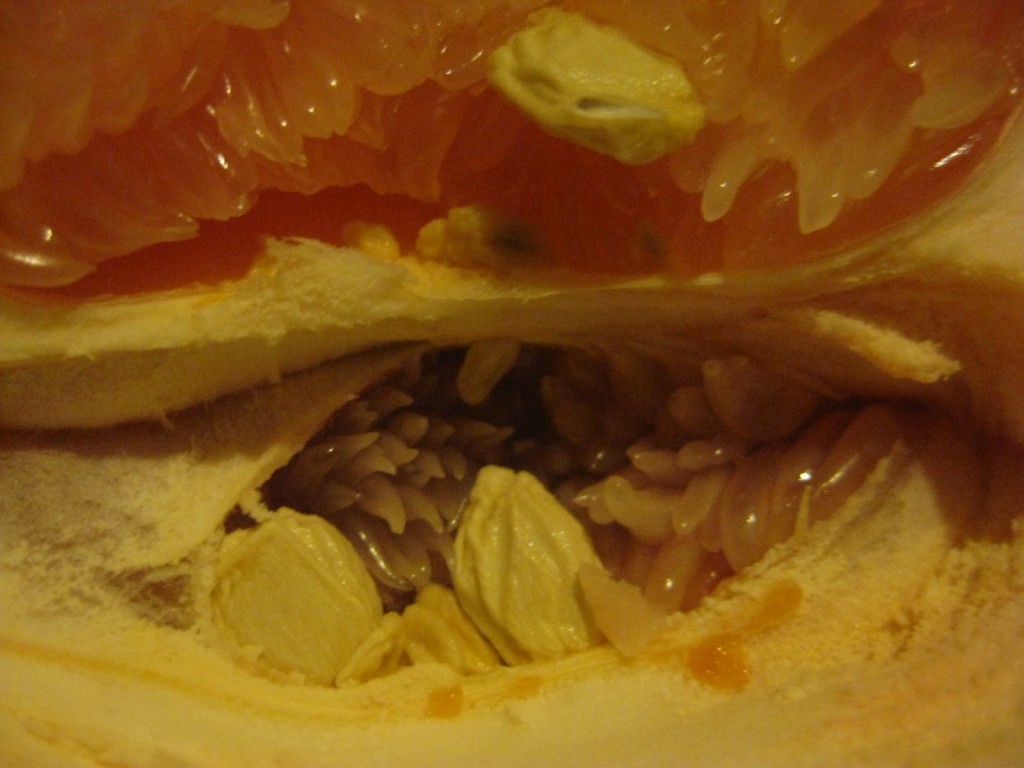turning peppers occasionally 4
1. Lucy Corin Web Log:
14. httpv://www.youtube.com/watch?v=0pMS5IMOxCA
Warhol on the Internet (imagine)
567. What is the contagious psoriasis to write shitty poetry? I did it. Hell, some people make a fine time/dime doing it. (I’m going to hell for linking to that kid, but add to tally, that one Tuesday, etc.) Is it developmental, in our DNA (99% of which we share with mice–this explains the dreadful sonnet [titled “Our Chance has Run”] about an ex-lover/farmer’s wife, a shooting star, and a sad owl I found in the cheese)? Maybe it’s a necessary process. The next step is to seek outlets for shitty poetry, explaining scam operations, blogs, script tattoos, and moms. You did it, right? Wrote shitty poems. Do tell.
4. What’s the glow day and time to write? I’m going obvious: Sunday, early morning, while the sky is low/blue, the caffeine burning off the hangover fumes. The brain hops. No?
The Life-Affirmier side of Rant

the gooey, somewhat sexual insides of this grapefruit are like the gooey, somewhat sexual insides of all our hearts. Photo (c) Julia Cohen.
Regular readers of this blog know that Julia Cohen is a frequent target of my admiration, but she gets special attention today for this awesome blog post, which starts off with portents of a not-good-news confession, then quickly becomes an apocalyptic screed, and then somehow finds itself soaring into an affirmation of why we all participate in the conversation of Arts & Letter, as well as a sort of declaration of her personal poetics and an expression of gratitude and thanks “to everyone who works in a creative medium.” Then to really round things out, there are two pictures of a bed designed to look like a cheeseburger. Anyway, you should take a minute and now and go read the whole post, which packs a lot of heart into a not-a-whole-lot of space, but here’s my favorite part:
Reading experimental poetry, listening to music, seeing a film or an art show, or reading theory that puts something in this world that is beautiful, constructive, advances dialog and new avenues of understanding- these are the moments that make me feel we, as humans, can provide something positive that would not exist on this planet without us. That’s the glow. For poetry, I’m intrigued by work that dismantles and then plays with the un-gendered “I,” that explores new forms of address, reckoning, and evinces culpability for the human and non-human other. Through new communication via what some may call anti-narrative, the links between fragmented image, quiet but firm declarations, and the transitive property of memory in complimenting and translating subjective experience to an other. Works that are about inclusive resistance and inclusive revolt, that emanate a destabilizing yet regenerative force, that may on the surface look surreal though are anything but.
I think it’s fascinating that one of the most talented, compelling and elusive poets I know (or know of) should somehow come to produce some of her most nakedly earnest and straightforward utterances in the course of articulating the value of art that fragments, challenges, “dismantles” or otherwise subverts conventional notions of narrative and meaning. This paradox seems, to me at least, to be exactly the point.
*****SPECIAL JULIA COHEN BONUS SECTION*******
Remember last week, when I liked Cohen’s chapbook, The History of a Lake Never Drowns ?
Three of her poems in diode v1n3
Cohen co-edits Saltgrass, which has a new issue (#3) out, which I’ll probably blog about at some point in the future, probably about two days after whenever she gives me a copy of it.

Cohen at the KGB Bar, with Paige Taggart (left), 10/08. Photo (c) Star Black.
